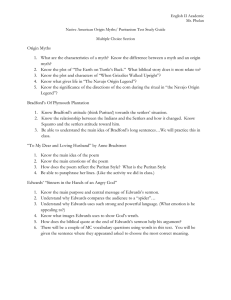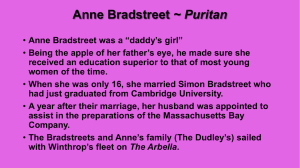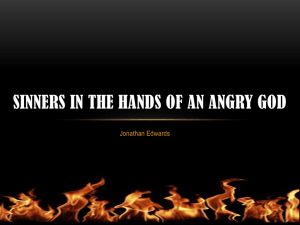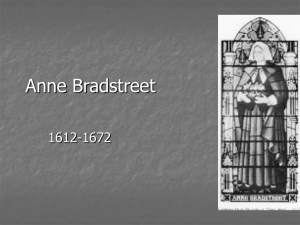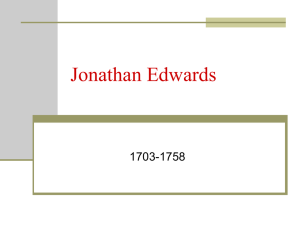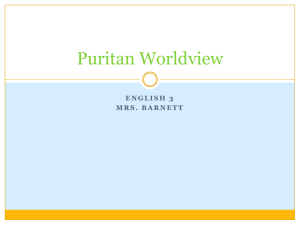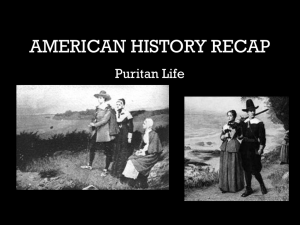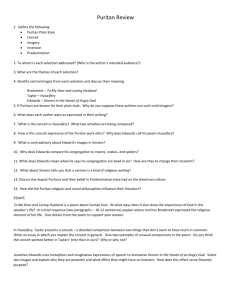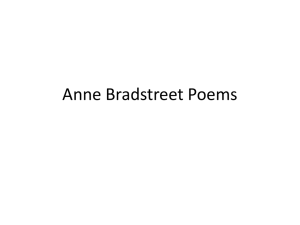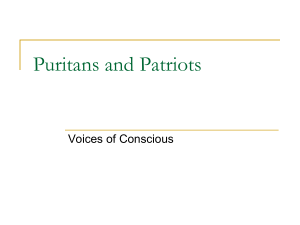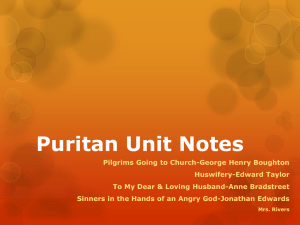Puritan Notes
advertisement
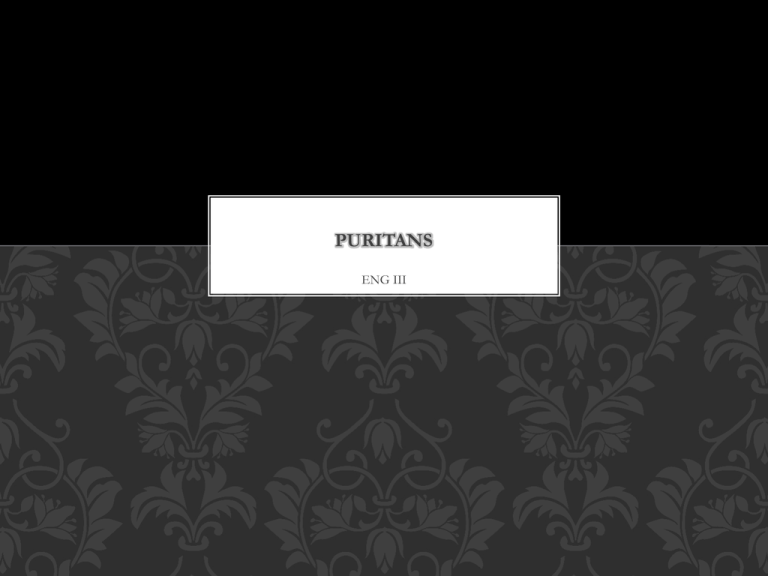
PURITANS ENG III WHO WERE THEY? The Puritans were religious reformers who wanted to ‘purify’ the Church of England After leaving England, they decided to cross the Atlantic to the New World and start over, in the hopes of establishing an ideal community founded on moral and religious values, or a “city upon a hill” The Mayflower landed at Plymouth, Massachusetts in 1620 WHO WERE THEY? Puritanism influenced almost EVERY aspect of colonial life Predestination: God has already decided who will be saved Puritan ethic: Hard work and self-discipline were extremely important Self-examination and spiritual insight were extremely important as well These aspects of Puritan life are evident in hymns, sermons, histories, journals and autobiographies of the time RELIGIOUS BELIEFS Believed in the followings of John Calvin Original Sin: Man is born corrupt because of Eve’s sin Limited Atonement: Jesus only died for the elect, not for everyone Elect: the select few that were saved God’s grace could save us but only a select few OTHER BELIEFS Were intolerant of other religions Saw narrow-mindedness as a source of strength Believed in hard work Because they expected little of life, they were rarely disappointed World filled with evil World was a work house, not a play house OTHER BELIEFS Promoted education and reading Must be able to read in order to read the Bible Against anything the Bible is against, technology, democracy, pride, sleeping during sermons, divorce Created first college, first bookstore, first newspaper Very strict interpretation of the Bible—whatever the Bible said was the final word http://www.youtube.com/watch?v=4UENmCY s4sM OMNIPOTENT OMNIPOTENT Having virtually unlimited authority or influence. HITHERTO This HITHERTO Up to this or that time MITIGATION MITIGATION To cause to become less harsh or to make less severe or painful. SERMON SERMON A religious discourse delivered in public usually by a clergyman as a part of a worship service. INEFFABLE INEFFABLE Incapable of being expressed in words. “SINNERS IN THE HANDS OF AN ANGRY GOD” Reader’s Notebook-pages 28-32 RAFT Activity Role Audience Format Topic Jonathan Edwards’ Mom Congregation Letter Son was right with message and why townspeople must change Wife of Jonathan Edwards Mother-in-law OR Ladies of the Church Letter Proud of her husband’s message Adult in the congregation Jonathan Edwards Letter Response to the message Child in the Congregation Parent OR Best Friend Letter Response to the message VOCABULARY FOR SECTION 5 Ineffable Sermon Omnipotent Mitigation hitherto PURITANS IN AMERICAN LITERATURE From “Sinner” QUESTIONS TO ANSWER 1. 2. 3. 4. What message is Edwards conveying in this sermon? Quote two places where he directly states his purpose. How does Edwards fit your image of a Puritan? What is the main emotion Edwards uses to persuade his audience? Quote an example and explain how this example shows the emotion. Create a bubble chart that has the word “wrath” in the middle. Find all the biblical illusions, stories, characters, and imagery that Edwards uses to describe God’s wrath. The answer this question: “How does each archetype add to the power of Edwards’s message? COMMUNITY OR INDIVIDUALITY? The pilgrims values religions devotion, work, and duty of private emotions. Yet, Anne Bradstreet’s poems are filled with her personal feelings. Should writers focus more on a sense of community or on their own individuality? Write a brief paragraph discussing your views. VOCABULARY Quench – satisfy a thirst Recompense – something given or done in return for something else Manifold – in many ways Persevere – continue despite hardships ANNE BRADSTREET • • • • • • • • • Arrived in Massachusetts Bay Colony in 1630 at age 18 8 children Multiple illnesses Writing was considered “unladylike” She wrote for herself First poet published in the new world First female writer of any kind published in the new world Some consider her an early feminist Purpose of her first publication was “to show that a godly and educated woman could elevate her position as a wife and mother, without necessarily placing her in competition with men.” READ: “TO MY DEAR AND…” Read “To My Dear and Loving Husband” by Anne Bradstreet. Answer the following questions: 1. What is your image of Anne Bradstreet after reading this poem? How does she fit the image of a Puritan? 2. In what ways is Anne Bradstreet and Jonathan Edwards alike? In what ways are they different? How does their literary works (“Sinners in the Hands of an Angry God” and “To My Dear and Loving Husband) compare? In what ways are they different?
